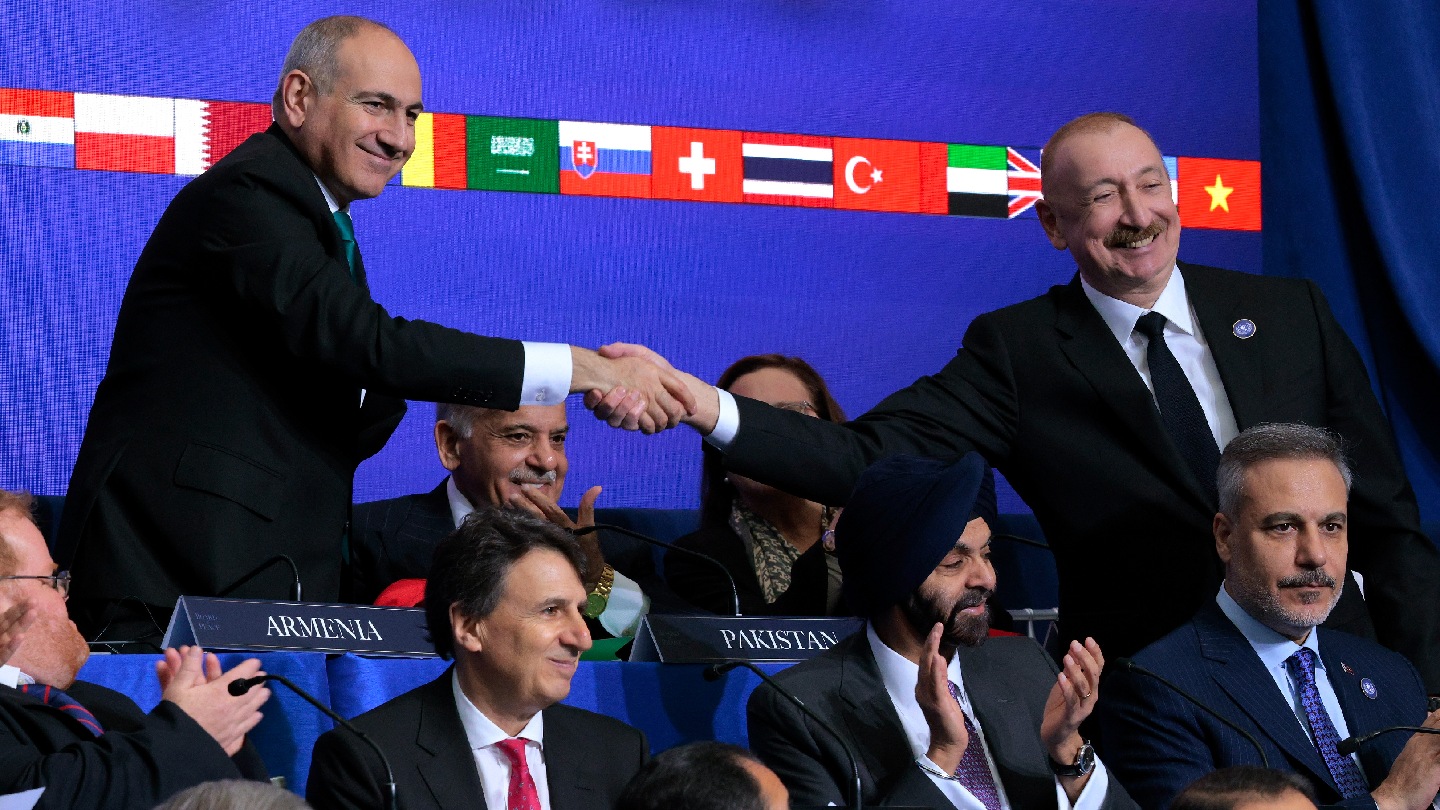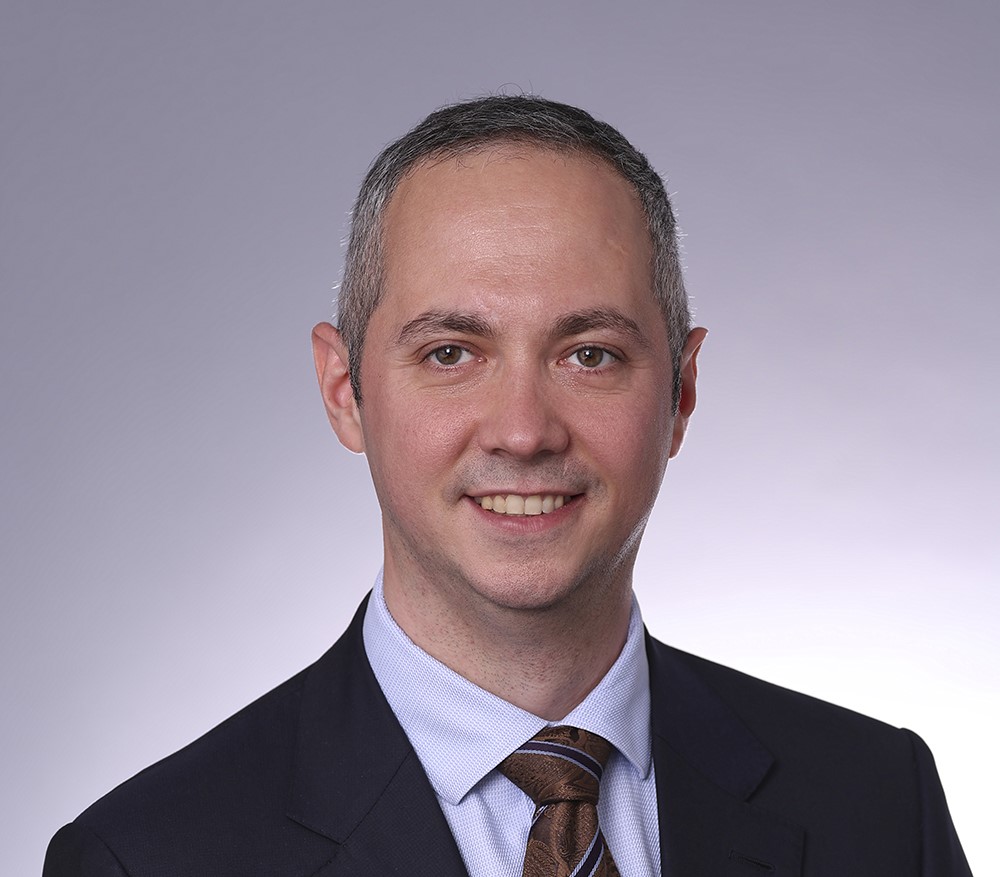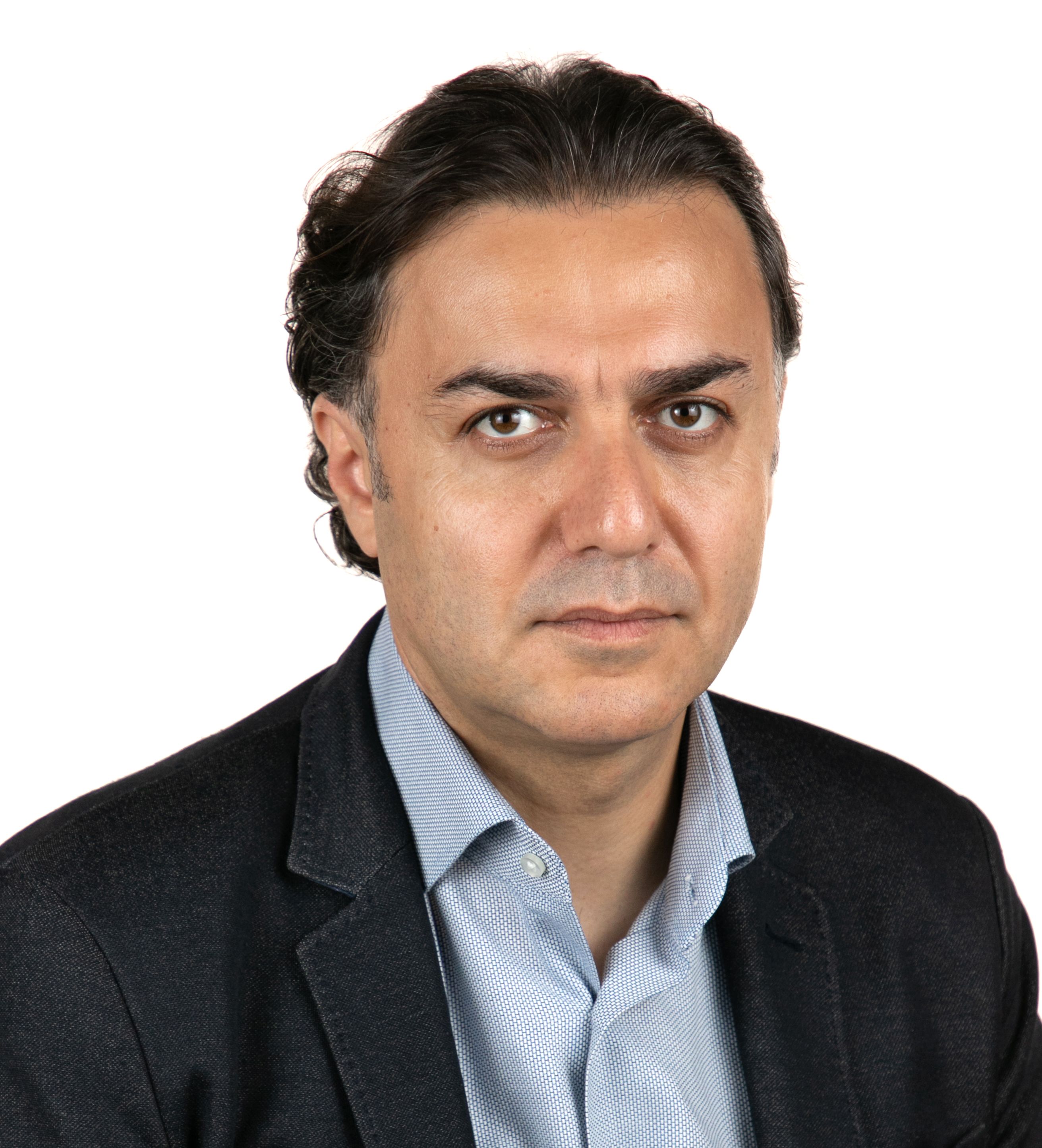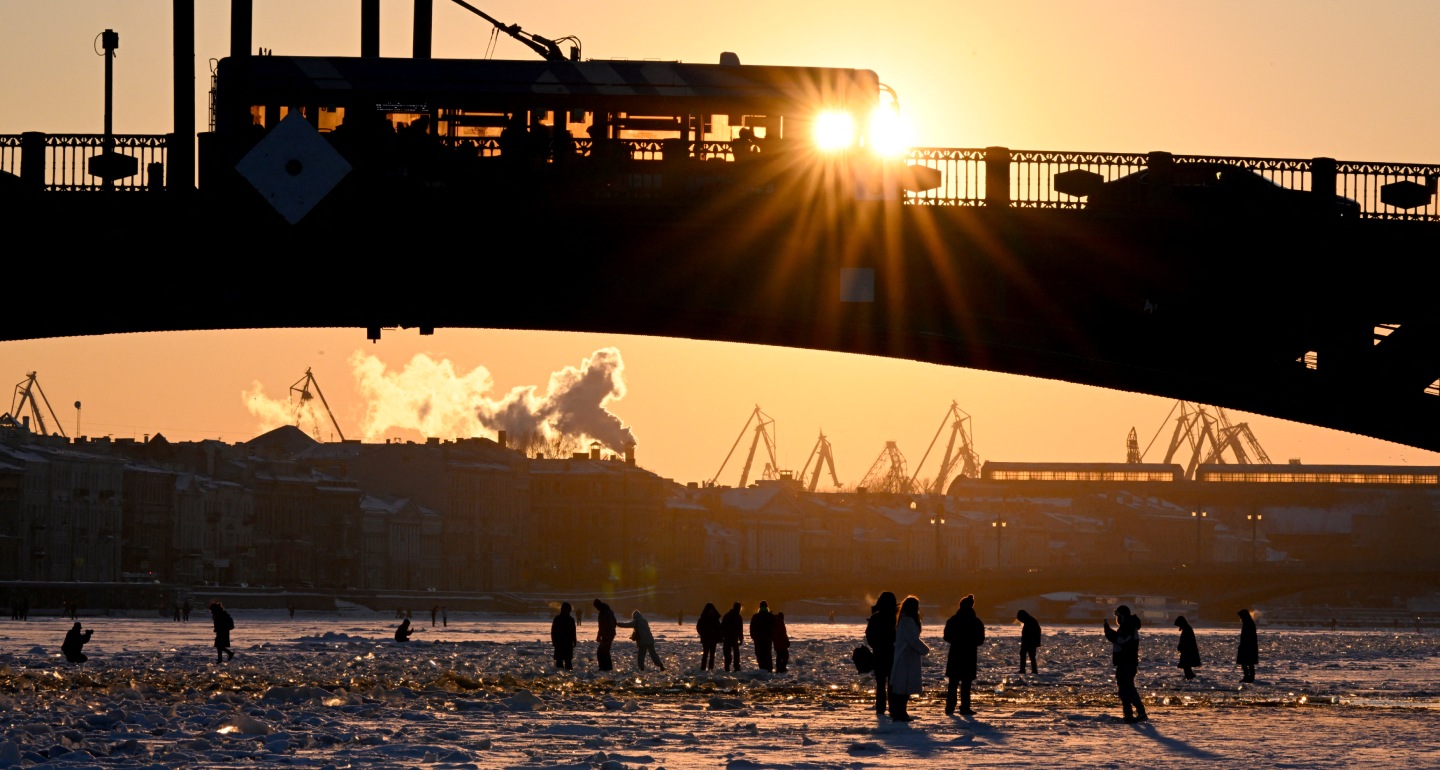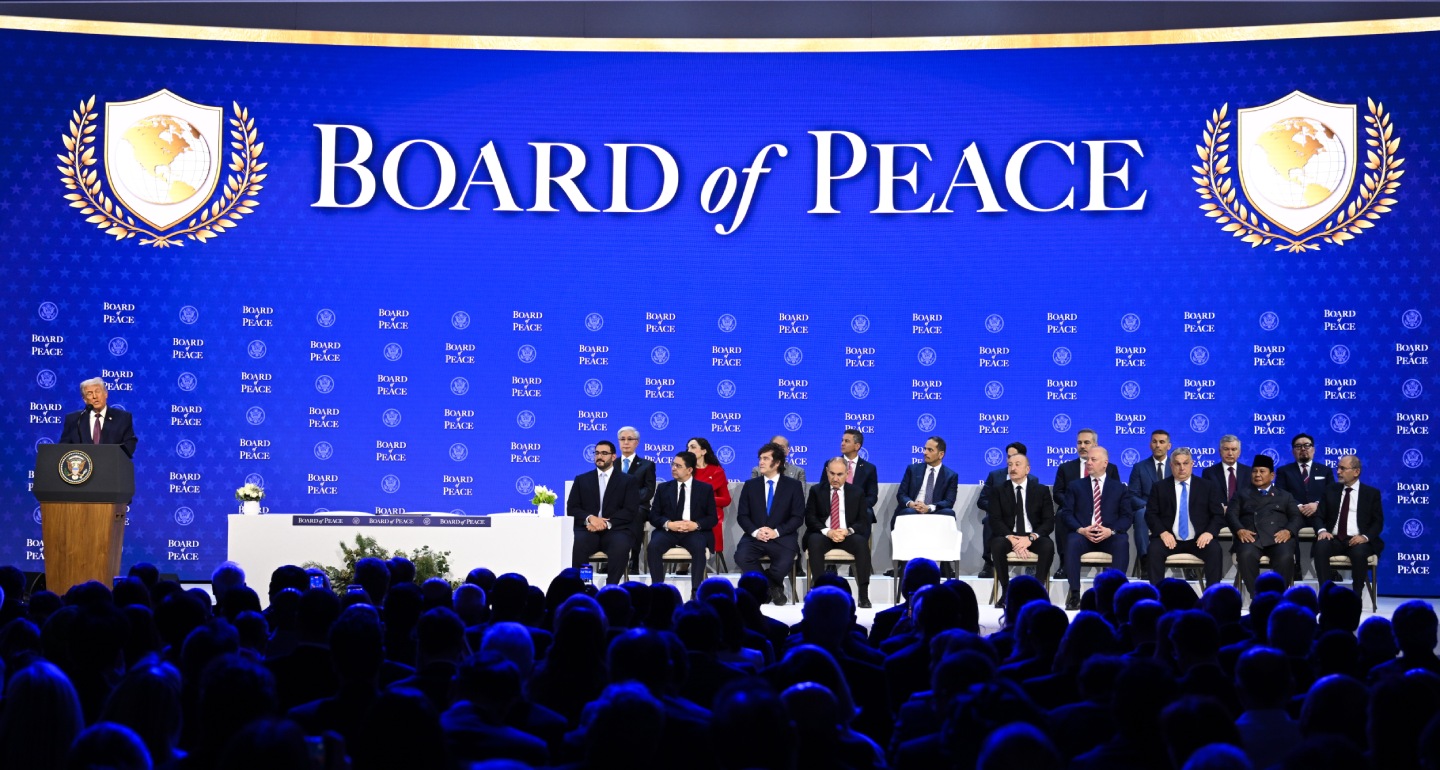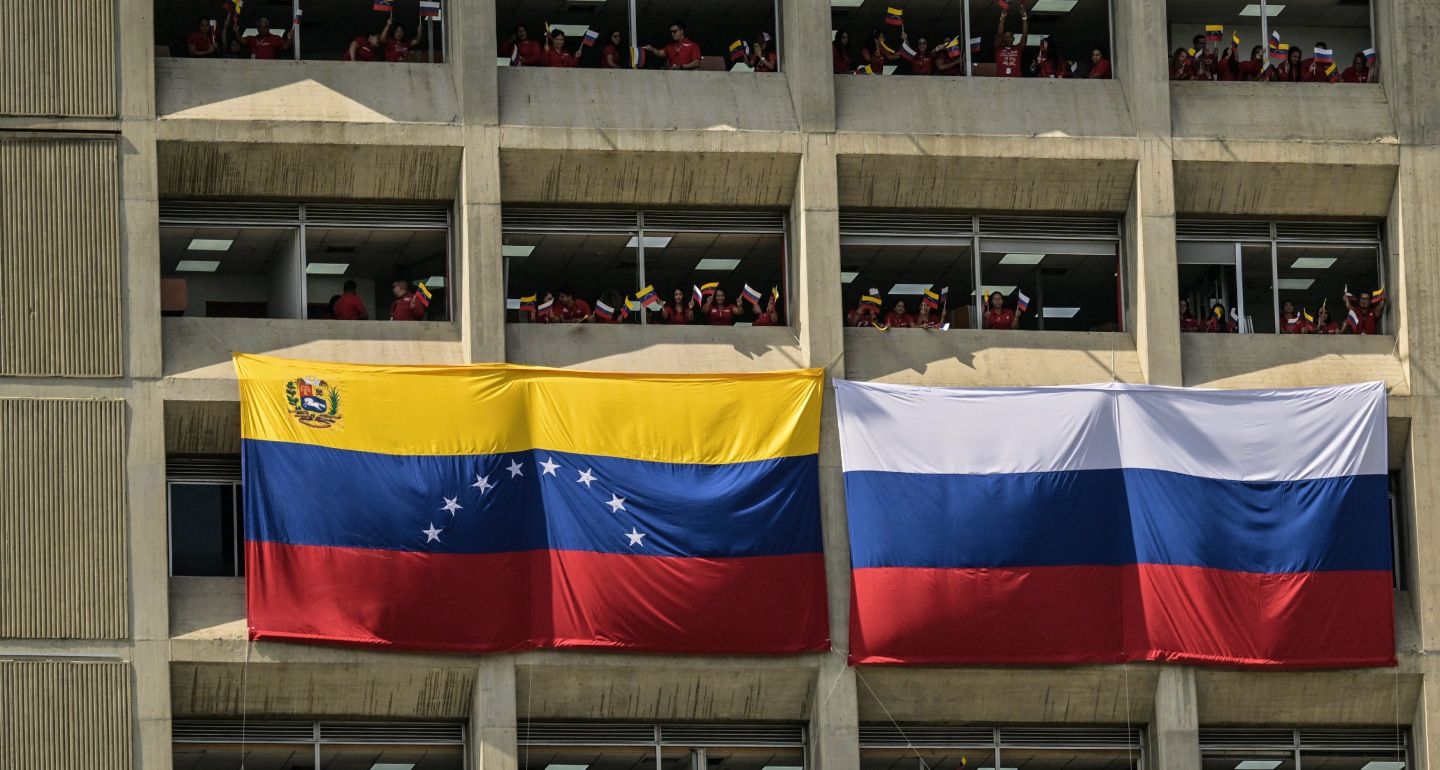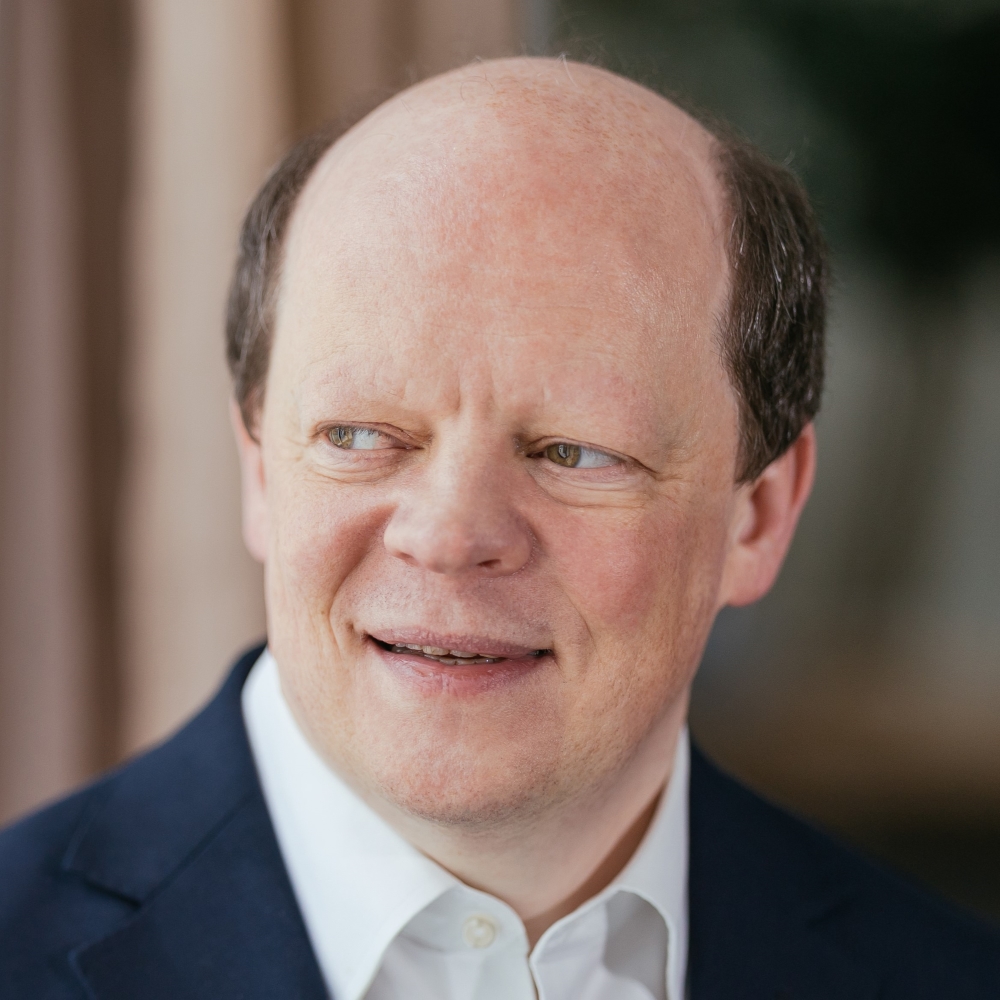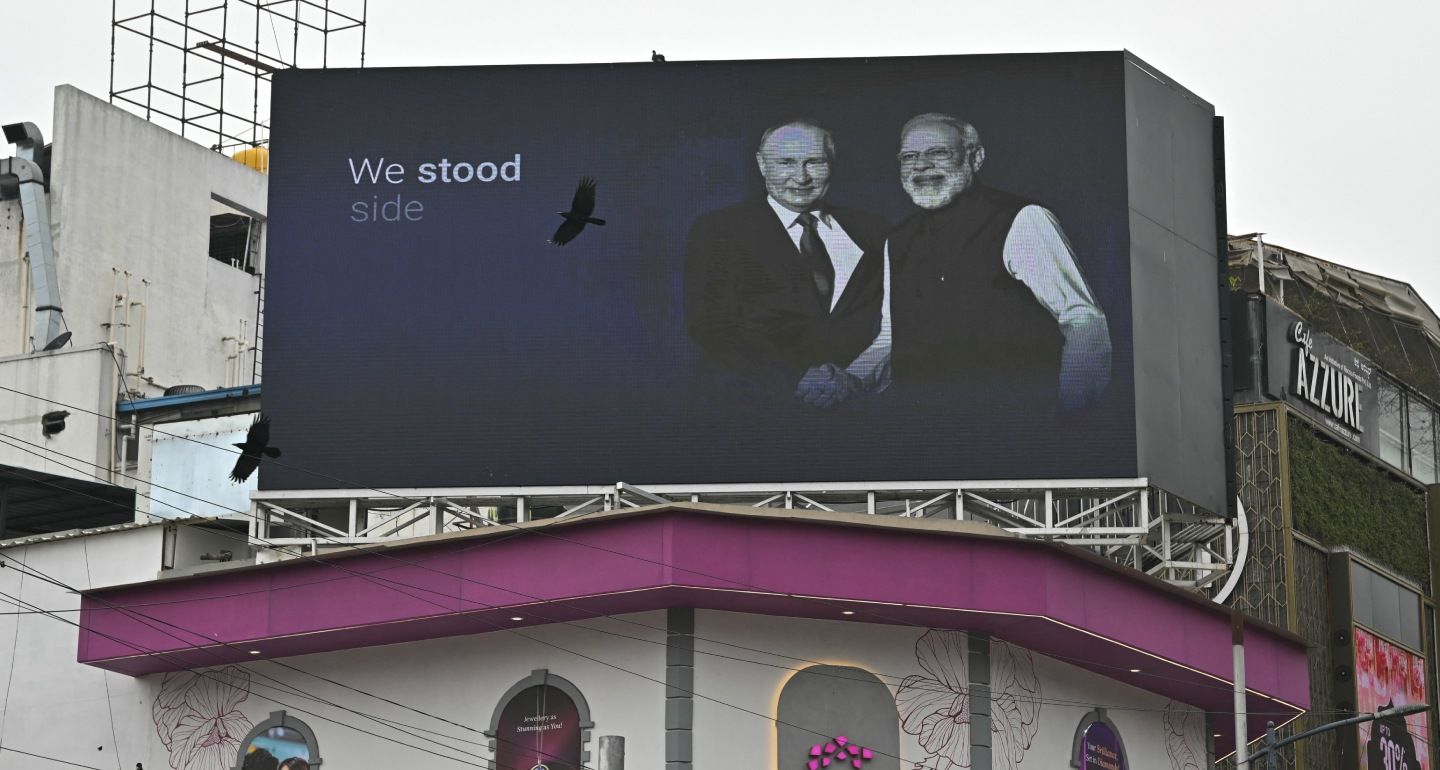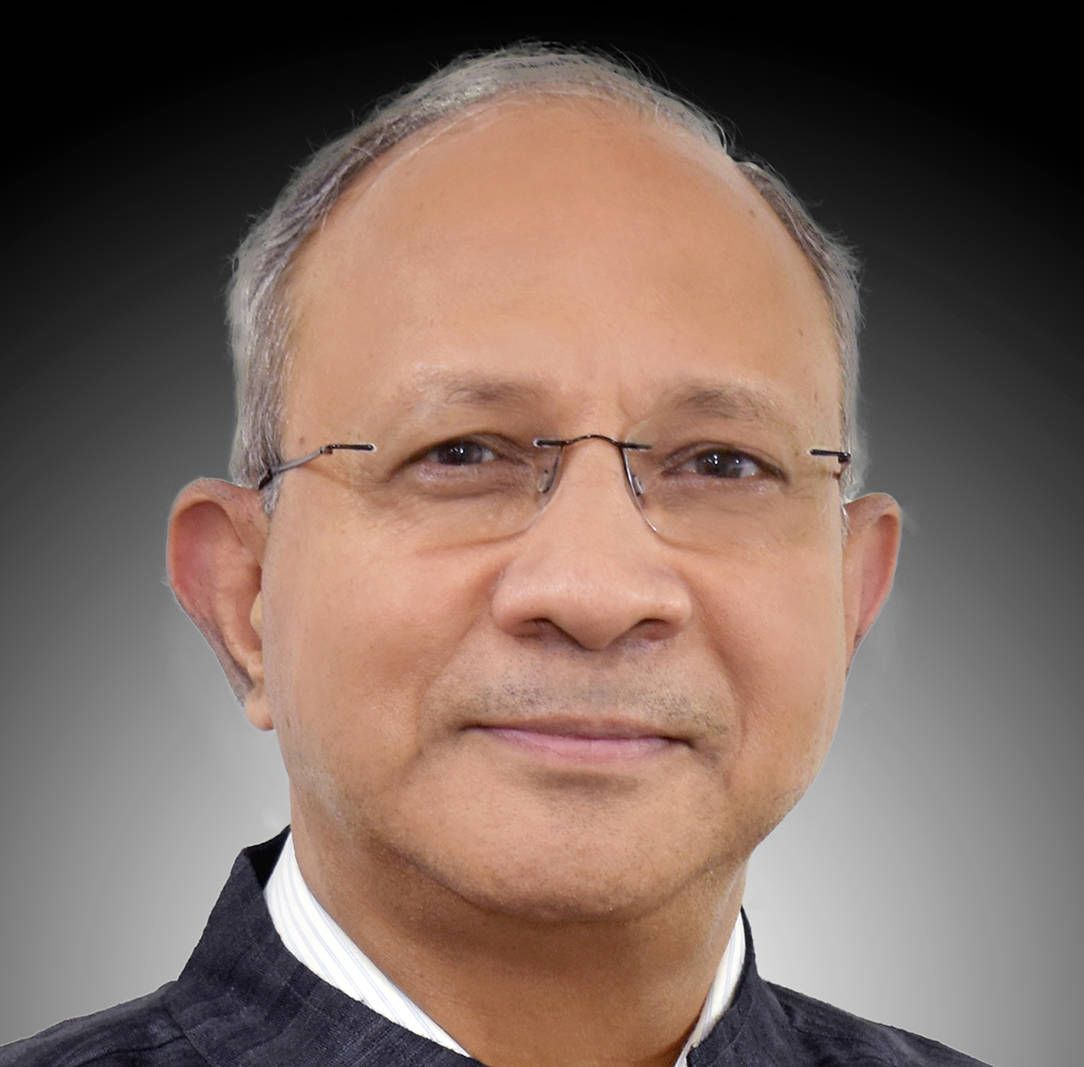Russia has had a year to convince Trump to give up on Ukraine and force Zelensky to surrender, but at the end of 2025, we are yet to see any significant results from the Kremlin’s efforts. After a triumphant beginning that had Europe and Ukraine worried, and an unprecedented Anchorage summit between Putin and Trump, the situation no longer looks as favorable for Russia. The planned Budapest summit has been called off, Trump has introduced the first sanctions against Russian oil giants since returning to the White House, and the U.S. president never misses an opportunity to criticize Putin for being intransigent. What contributed to Russia’s diplomatic failure? When did Putin stop relying on his diplomats, and how did the Russian Foreign Office come to be nothing more than another source of the Kremlin’s delusion and another mouthpiece for Putin’s propaganda?
The transcript was automatically generated and not edited prior to publication.
Alexander Gabuev. Welcome to the Carnegie Politika podcast. My name is Alexander Gabuev. I'm director of the Carnegie Russia Eurasia Center in Berlin and the host. Today's episode is dedicated to Russian diplomacy in the Trump 2.0 era. And my guest is BBC Russian Service special correspondent Elizaveta Fokht. With Donald Trump's re-election, Vladimir Putin has gained the most comfortable US president in the White House that he could possibly dream of. Trump said that he wants a quick deal to end the war in Ukraine. And many have expected that if an agreement is to be achieved, it's going to be a quick and dirty deal at the expense of Ukraine. And yet, as the first year of the administration comes to a close, the peace deal is not in sight. Moreover, Trump blames Vladimir Putin for lack of progress in the talks, with increasing frequency. He also has imposed massive sanctions against Russia's two largest oil companies, and the U.S. is continuing to provide weapons and intelligence for the Ukrainian self-defense effort. Is Russian diplomacy to blame in the impasse when the Kremlin can't manipulate the US president to its advantage? We'll discuss that with Elizaveta Fokht, who is covering Russian domestic and foreign policy and like many independent Russian journalists has left the country in spring 2022 after the full-scale invasion of Ukraine. Hi, Liza. It's great to be with you.
Elizaveta Fokht. Hi, thanks for having me.
Gabuev. Since the beginning of Trump's second term, there is a predicament that puzzles me, and I hope that you can help me to unpack it. On the one hand, you have a very unorthodox US president, to say the least, who doesn't share mainstream views about the need to uphold rules-based international order, who spoke favorably of Putin and Russia for many years, and who has blamed Russia's invasion of Ukraine on Joe Biden or Volodymyr Zelensky multiple times. So in a nutshell, it seems to be a gift to the Kremlin. And one would assume that Putin and his national security team would jump on an opportunity to exploit this White House and seal a deal to end the war that is very favorable to Russia, but not to Ukraine. And yet, this is not happening. We are at the end of the first year of the administration, and it seems that the position of Trump and his national security team has toughened. So it seems that Russian diplomacy is simply unable to exploit the opportunities presented. Do you agree? And if yes, why is it so?
Fokht. Yes, I think I agree with you in principle. And I do think that Russia had a window of opportunity because of Trump, which I think now it's safe to say that it used not to its full benefit if we're judging this from from the Kremlin's perspective. I think having a really good, suitable deal with the Americans has always been, and maybe still is, the best case, ideal scenario. But I think it's important to remember that Moscow and Putin, they do have experience with Trump. We remember his first presidency, which didn't bring any significant gains for Russia, not in Ukraine, not elsewhere. So having that in mind, I think my feeling is that the main focus in this first months of Trump's presidency was to create a situation where a) Ukraine and Europe are completely excluded from the conversation when Putin and Trump are just talking to each other, when we have Yalta 2.0, where those two important presidents decide on the fate of Europe and Kyiv and Volodymyr Zelensky and his allies are just, you know, watching from side, b) U.S. military and diplomatic support of Ukraine is significantly, if not fully, reduced. And c) there's disarray within NATO and relationship between the U.S. and its European allies are becoming more and more complicated. And I think this approach seemed to be working at the very beginning because Europe and Ukraine were excluded from this conversation. There was a feeling of panic in in Europe. I've been, as a journalist, to emergency summits in Paris. We all saw what happened during the Munich Security Conference, which was the first occasion of this new American administration officials, J.D. Vance, Pete Hegseth, etc., coming to Europe, and what European leaders heard from them definitely didn't help this this anxiety that everyone had about Trump coming back to the White House. And of course, what happened in the Oval Office in February between President Trump and Vice President J.D. Vance and President Zelensky, of course, didn't give any room for for optimism. And at the same time, we've saw that the US and Russia started talking to each other. We saw his first meeting in Saudi Arabia, and Special Envoy Steve Whitcoff, who's very close to Trump, started going to Russia back and forth. And there was all this friendliness. And indeed, just as you said, Trump, we would hear something like Zelensky is the one to blame for a war, that Zelensky doesn't have any card and he needs to just take what's offered to him and just end this war because Ukraine is not going to stand. And at some point, we even saw him stopping sharing intelligence with Ukraine. And I think only time will tell when we have a full account of what happened during those spring months, how it affected Ukrainian position on the battlefield. But yes, this was, if not the base case scenario of striking a really, really good deal with Trump, then at least significant progress of what it was even a year or months before that, when the Biden administration was in power. And yet I think at some point, Vladimir Putin and Russia, they maybe outplayed themselves a little bit... Oh, and by the way, what I wanted to add, I think the scenario where Trump just gets tired of this very complicated war and just walks away as we saw happening with North Korea during his first presidency - this scenario was also completely fine for the Kremlin. America just being out of the picture and Europe having to bear all the cost and the implications and diplomatic support of Ukraine. That would be okay, too. But I think for that to happen,Vladimir Putin had to give Trump at least something, and it didn't happen. Whereas Ukraine and its European allies, they managed to recover from the initial shock. Zelensky changed his rhetoric. He started wearing a suit. We saw this flattery coming coming from Brussels, London, Paris, all the European capitals. We have seen NATO allies agreeing to this very important measure of - this is what Trump really, really wanted to achieve - raising their their defense spending to 5% GDP, which was a huge personal victory for for Trump. And it covered this NATO summit in The Hague. And for an outsider, that seemed slightly odd. You know, Mark Rutte saying that Trump is their daddy and this flattery is somewhat unconventional and unorthodox for diplomacy as we know it. But as you said, Trump is an unorthodox president. But this approach seemed to have worked because now we see a very different rhetoric towards Ukraine coming from the White House. Yes, sometimes Trump still says that it's Zelensky's war and Biden's war and it is very tough for Ukraine, but nothing like what we've heard from him in the first month of his presidency. So yes, I think it's fair to say that Russian diplomacy and personally Vladimir Putin failed to exploit some of the opportunities that that presented to him. And I think the most important evidence of that is what happened after the summit that President Putin and President Trump had in Alaska, which essentially didn't lead anywhere. And thanks to Bloomberg and Financial Times and Reuters reporting, we know that the summit didn't go well. I mean, it was obvious in Anchorage that it didn't go well. I was there in the meeting, it turned out to be much shorter than we all expected. There was this odd press conference where they didn't take any questions. So it was clear that there was no significant progress. But then Trump's rhetoric again completely changed. He started to repeat how much he's disappointed in Putin. That was something new, something that we didn't really hear from that before, maybe a little bit in June, but that was like a completely other level. And then, when it felt like maybe it was going to 180 degrees again, they had this call; they agreed to to meet in Budapest; that failed too. We now know that there are no imminent plans of their meeting. So yes, I think at this point, we can say that this honeymoon period that they seemed to have in February and March is completely over. And there's just another chapter in this relationship. It's time for another chapter.
Gabuev. I want to come to the Budapest Summit in a second, but before we do that, I would really urge everybody who is listening to this podcast to hit the subscribe button in order not to miss any new episode. And we would very appreciate your feedback because we are very interested in what you think about all of these developments. Well, I think that I agree with you. There are many elements that you mentioned that Team Europe and Team Ukraine can give to Trump. This is this 5% GDP weapons commitment. It's now that NATO allies are purchasing American weapons to transfer to Ukraine. So American taxpayers are not involved in direct support of Ukrainian self-defense out of their pocket, but it's now profitable business. With all of the sanctions and commitment of Europeans to wind down their energy dependency on Russia, these volumes are mostly replaced by American LNG, which used to be called molecules of freedom. So this war has turned into a very profitable enterprise for America, Inc., in a way, and that's not the worst outcome for Ukraine because the weapons still continue to flow, supported by intelligence sharing. And Russia's cash flow is being increasingly put under squeeze by Trump's relentless push for the Europeans to adopt the sanctions. And for some reason, the Russians had this window in Spring of this year, and nevertheless, because of Putin's stubbornness, it somehow disappeared and closed. But the latest episode is very interesting. Let's talk about this for a second. I think that as in every toxic relationship, there are these emotional swings between Putin and Trump. And we've heard that the most recent breakdown of a potential summit meeting came through the most professional member of Putin's national security team, which is Sergei Lavrov, his diplomat who has been there for 20 years, who has been the longest serving member of his cabinet, who has been named diplomat of the year or whatever, the best serving diplomat by many media outlets, not only Russian outlets.
Fokht. I hope Yuri Ushakov is not listening because he might be offended by your description. Maybe he feels he's the best experienced and trusted.
Gabuev. I know that some Russian diplomats and senior officials are listening to this podcast, so we'll let them debate this. But nevertheless, so there is Sergey Lavrov who first, when there is an agreement between the presidents to meet in Budapest, sends a memo to the State Department, and we don't know the exact content, but as reported by the Financial Times, it was digging into the most aspirational Russian positions and just stating the obvious that Russia will not dial down its demands on Ukraine compared to what happened in Anchorage. And then Lavrov and Marco Rubio, Trump's national security advisor and secretary of state, have a call, which obviously didn't go well because Rubio, by what we know from reporting of your colleagues, told Trump, no, the Russians are not ready to meet us halfway. Let's cancel the meeting because it will not lead to any progress. Then Sergei Lavrov is not that active anymore. We see him in public yet. He reappeared today again, but he was absent, for example, from the latest Security Council meeting. Do you think that it's Sergei Lavrov who can be blamed for the latest breakdown in the relationship? And more broadly also, what do you make of Lavrov's political longevity? Like, what's the secret? There are obviously plenty of much younger diplomats on the Russian side. Why him?
Fokht. Well, that's a lot to unpack here. Let's let's start with Budapest. I think, firstly, to be fair to Sergei Lavrov, from what we heard today, he insists, and I don't know if it's important, but let's be fair to them, that it wasn't a memo, it was a non-paper. What's the difference? No one really knows. But yes, essentially, he confirmed that there was some kind of document that Moscow sent to D.C., to the White House. He insists that happened before Trump and Putin talked to each other. I'm not sure if it changes the whole picture, but again, let's be fair to them. This is what they say happened. I think what's important for us is is the result, and the result is that there's no meeting in sight. And I think Trump confirmed it himself. He was giving this press conference with Viktor Orban, and one of the journalists asked him what's the reason why there's not going to be a meeting in Budapest. And I think what Trump said, to quote him, he said, the basic dispute is they, meaning Russia, just don't want to stop yet. So I think the person who's calling the shots here, the person who sets the tone and makes those very important political decisions is Vladimir Putin, not Sergei Lavrov. We don't know what happened during this call. Indeed, there was a reporting, you know, Bloomberg FT reporting that Rubio, after this conversation, felt that Russia is not ready to make any significant compromises, something that I think became clear in fairness to Lavrov, to the U.S. in Alaska because from what we know, from what I heard from top European diplomats, both sides came to Alaska with a very different understanding of what the other side was prepared to do in order to end this war. And yes, I think if we have to speculate, maybe we can imagine a situation where Lavrov during this call was maybe balder that it was necessary because I think the task, at least this is how I heard Putin and Trump, not Putin, like Ushakov, he spoke to some journalists after Putin and Trump talked on the phone, but essentially Rubio and Lavrov, they were both tasked with basically arranging another presidential summit. So when you have a call like this, I don't think it's time to maybe exchange both positions and argue. The task is very simple. The task is to say, yes, we still have a significant differences.There are many things that we disagree on, but let's talk them through in Budapest with our friend Viktor Orban, and it's going to be fine. Can I imagine a situation where Lavrov would start pushing, you know, the Kremlin's agenda during this call unnecessarily? Maybe, yes. But what I think is important to remember is that he's always pushing Putin's agenda. So if you need to point a finger at someone, I think we should point a finger at Vladimir Putin's because essentially and Lavrov has been repeating it. What he's repeating is the demands that we heard from Putin in June 2024, when he was talking to the MFA where he outlined the compromise, which is not really a compromise, what it really is essentially is the demand of Ukrainian capitulation, but it hasn't really changed. We know that maybe according to some reports, Russia is ready to make small compromises when it comes to the issue of Ukrainian territories. I think it's very important to understand that it seems to be the most sensitive issue, which is understandable because when we're talking about lands, we're not talking about lands. We're talking about Ukrainian people who live there. This is why it is so sensitive and it is indeed important. If it weren't important for Putin, we wouldn't see Russian troops pushing all across the line of contact and trying to take over those villages, many of which only exist in name on the map because of the scale of destruction in in those regions. But there are other very important issues, such as security guarantees; just broader, the future of Ukraine after this war. The issue of NATO expansion, which is really, really important for Vladimir Putin. He's the most important diplomat calling the shots here. And I think this is why we shouldn't blame it entirely on Sergei Lavrov. I also think that we shouldn't read too much into his absence during the Security Council, et cetera, et cetera, et cetera, because what we know about Putin, and we have observed him from many years, you much longer than me, [is that] still it's not his style [to] punish officials for any missteps, especially missteps that have or haven't been made in an attempt to defend Russian national interests - because this is what Lavrov has been doing his whole life. This is the answer to your second question. What's the secret for his longevity? His loyalty and his determination to defend Russian national interests, maybe sometimes even in a way that is harmful for the purpose of diplomacy. But still, I think Putin really values that. And this is why Lavrov is still the Minister of Foreign Affairs of the Russian Federation. That would be my answer. I don't know if you agree with that.
Gabuev. I completely agree. I think that it's very hard for me to imagine Lavrov being fired or put into any kind of political Kamchatka because of standing up for Russian interests, particularly along the lines that President Putin has outlined himself. And I agree with you that the major obstacle to peace is Putin's own stubbornness and inability to imagine a victory in a different way for this cruel and horrible war that he has started. The long-term benefits to Russian security and prosperity is a different universe. We won't even start that conversation because we all get too depressed talking about it. But to me, indeed, I've watched since I was a member of Lavrov's press corps since 2010. And I watched the evolution where a lot of decisions that have been taken, we know, Lavrov was the last to be informed among senior officials. Crimea annexation, many of these decisions have really not taken members of the MFA or senior-most diplomats into account. They have not been consulted and they've been given marching orders last minute in order to go and justify or go to declare certain things and then negotiate. And he has been complicit in that. He has not resigned. He's still happy to compete with Gromyko in order to be the longest serving Minister of Foreign Affairs for Russia. And you don't see any limits of his ability to absorb of what Vladimir Putin imposes on him. And with that, it's very interesting to see another figure appearing as a very important channel between Russia and the US. And that's not a professional diplomat, but a businessperson named Kirill Dmitriev, head of the Russia Direct Investment Fund. He was the one who established this channel to Steve Witkoff and attempts to play an important role. For example, when Rubio's talks with Lavrov broke down, Dmitriev jumped on the plane, went to the U.S., was trying to see senior U.S. officials, was seeing Witkoff for lunch in Florida. So he is playing a very important and somewhat mysterious role.What's his secret in your view?
Fokht. Yeah, let's talk about him. One thing I wanted to add about Lavrov, which I think is really important to understand, that Lavrov is still the face of Russia's foreign policy, even if he's at times incapable of actually shaping it and is often forced to assume the role of someone who defends moves like the invasion and all those other measures, steps that are highly unpopular in the world. Andthis probably doesn't really help his personal brand as a diplomat. But it's important that he's willing to take on this responsibility. And I think Putin definitely values that and and appreciates that because this is another sign of real loyalty - being out there, being this person who faces all this scrutiny, and he still does that. He's been doing it for a very long time. I don't think that Lavrov and the MFA welcome Kirill Dmitriev's participation in this process. I doubt that they like it at all. Again, we've seen some reporting from Bloomberg, Reuters, Financial Times, indicating that they're not happy about this whatsoever. I think it doesn't change the picture a lot because recently, I don't know if you've seen this interview, but the head of the U.S. Treasury referred to him as a Russian propagandist, which I don't think Dmitriev liked very much, given that he's been trying to establish himself as a serious negotiator [and] diplomat.
Gabuev. But he deserves it.
Fokht. But he deserves it. Yeah. And I think it's important to remember that in Alaska, which, as we established, didn't go according to the plan, but still Lavrov with Yuri Ushakov, they were both in the room. And Dmitriev was posting pictures, pictures of Alaskan wonders; he wasn't actually in the room. I think Dmitriev definitely, when Trump came back to power, saw an opportunity and definitely seized it because of his contacts in the US and, most importantly, within Trump's inner circle. We know that he knows Jared Kushner, Trump's son-in-law, other different people. I guess it was easier for him initially to establish this contact between the Kremlin and the White House because he's not a diplomat. And sometimes it's much easier for people who are not actually diplomats to do those things, to do some kind of a Track Two. But the most important thing is not establishing contact, which I think the MFA would have eventually succeeded in with or without Kirill Dmitriev, but making real progress. And he has neither agency nor real opportunity to do that, because the whole pitch that we've seen from Kirill Dmitriev is that it would be incredibly beneficial for Russia and the U.S. to to be friends again. Is it extremely beneficial? I'm not an economist, and you have many, many colleagues who I'm sure have much better credentials to explain this. But even pre-war, the volume of trade between Russia and the US wasn't amazing, outstanding. And I think it's much easier to make a case that Europe and Russia should be partners and have great volumes of trade; that Russia and China or India, that it's mutually very, very beneficial to trade with each other actively. With Russia and the US, the case is slightly more different. We do know that Kirill Dmitriev is pushing for those very ambitious projects like building...is it a bridge or a tunnel?
Gabuev. It's a tunnel. It's a tunnel.
Fokht. It's a tunnel, yeah, connecting Alaska and Kamchatka, where essentially no one lives other than bears. So... But yeah, and I think, again, at the beginning, we saw him having a really friendly relationship with Steve Witkoff, who was going back and forth, in and out of Russia. And I definitely think that it added to the panic that we saw in Europe. Oh, look at them. They're having all those conversations behind our backs. But again, Kirill Dmitriev doesn't have real agency to say anything [like] "you know what, we really, really, really want to stop this war." I actually think it's important to remember, and I've been thinking about this a lot, and this is something that I've heard from President Trump many times, sometimes in person, when I was covering events with his participation. He often says Putin really - he actually stopped, I think, saying that, which I think is a really good indicator of how he actually feels about the whole process. But in June and April, he would say something like Putin really, really, really wants to stop this war. Whether you can make a case that it is difficult for Russia politically and economically to to go on for many years to come, I think you can also make another argument that politically and economically, it would be very, very difficult for Russia to stop. I think it is clear that Russia is in no rush to have a bad deal, or at least a bad in Vladimir Putin's eyes deal, with the Americans or Ukraine or any other country. I think Vladimir Putin's approach is that, yes, if America can give us everything that we want and we can also, in the process of negotiating with them, hurt Ukraine and make their relationship with the White House more more strained, that's great. Let's push for it. But if we can't get everything that we want, okay, we're happy to keep going. And I think... Actually, now I have a feeling that President Trump and and and Rubio and J.D. Vance, they finally have a much better understanding of this modus operandi from the Kremlin. And this is why we've seen this change of rhetoric, because they finally understand that, no, Putin doesn't want to end this war at any cost. He's ready to end it if it's beneficial to how he understands Russian national interests, which, as you said, we're not going to discuss in great detail because it's too depressing.
Gabuev. I'm afraid I agree with you. And unfortunately, Vladimir Putin relies much more on tools outside of the classic diplomacy toolkit. And over time, he's [been] in charge of Russia for a quarter century, Over time, he got much more reliant on brutal military force, be it Georgia, be it, well, he was technically prime minister, but we understand who was calling the shots. I was working as a Kremlin reporter back then, be it annexation of Crimea, be it Russia's involvement in the Syrian civil war, or it finally the war in Ukraine and the full-fledged invasion, and also the dark craft of the secret services. You, Liza, and your two colleagues at BBC Russian Service, Sergei Gorashko and Sonia Samokhina, also former colleagues of mine in my first professional home at Kommersant, have written a terrific piece that documents the evolution of Russian diplomacy. It was published in 2023, and I think that it was called "how Russian diplomats lost Vladimir Putin and influence on him." That, I think, won Redkollegia, the most important independent journalism prize in Russia. So what's your major takeaway? Why has diplomacy been marginalized? Because if you take a couple of steps back, for example, the first color revolution in Georgia, you remember that there was a kind of pro-Western opposition. There is an autocrat, Shevardnadze, who is ready to really confront the crowd. And then there is the Tbilisi-born Russian foreign minister, Igor Ivanov, Sergei Lavrov's predecessor, who flies in. And then a year after shuttle diplomacy between the two sides, there is a peaceful deal and peaceful transfer of power. So Russia was able to really steer and direct the political process in the situation that seemed to be adversarial. So that was still possible with the craft of Russian diplomats. And yet over time, this reliance on diplomacy has waned. Why is that so?
Fokht. I think the short answer would be that over the years in power, Vladimir Putin at some point had come to the conclusion that the West doesn't want to negotiate with him. It wants to destroy him. And if you believe that your adversary wants to destroy you, and that's the ultimate goal, you just stop believing in diplomacy as a tool of actually resolving conflicts. as a tool of cooperation, because you can't cooperate with someone who seeks to destroy you in Vladimir Putin's mind. Actually, you can. And we know that we've actually seen that. And if you compare, I think, again, our listeners would benefit from you talking on the subject... But even during the Cold War era, there were examples of successful diplomacy between Russia and the US, countless examples of Russia's diplomacy. And it was actually really interesting reporting this piece, because I was talking to former White House officials and former diplomats, and I was actually very, very surprised to learn that the USSR - and I was born in 1994, I didn't witness any of that - actually had a very successful and at times capable foreign foreign policy, which at times helped to avoid conflicts. I think if you have to draw a line somewhere - it's important to find a precise moment that when Vladimir Putin changed his mind, and I don't think it happened overnight, that one day he just woke up and thought, "you know what, I don't believe in diplomacy anymore. It's just not going to be a tool for me at this point." But I think the 2011-2012 period was really, really important, because Putin was convinced that the Russian street protests were supported by the West, and in fairness, they were supported by the West, maybe not financially, but definitely rhetorically. And the Arab Spring. And of course -I heard again from many former White House officials - the US involvement in Libya also convinced him that the West is just not interested in talking to him. So he thought, "okay, then we're just gonna act accordingly." And ever since, I think he's been much more interested in presenting his view of the world than actually discussing the actual cooperation. Why try to find ways for peaceful coexistence if you can tell your opponent your own version of Russia's history starting from the 13th century? Why discuss the actual ways to deter, to avoid crises if you can talk about Yaroslav the Wise and Rurik and all those other important political figures. You know what was really interesting for me? When we were reporting this piece, we talked to Ben Rhodes, who was a very senior White House official. He was on the Presidential Security Council. He was Obama's speechwriter. And he was present at most, if not all, his meetings with Vladimir Putin. And what was surprising for me, growing up as a young journalist and listening to Putin's speeches, his State of the Union annual address and all those different things, I would think, "okay, this is for our conception, but when it's behind closed doors, he's actually much more pragmatic. He says, 'this is our national interest. This is your national interest.'" But what Ben told me, [is] that essentially he repeats the same things that he says out loud when the whole world's watching. So for instance, he told me that he had a meeting with Obama, I think closer to the end of his term, where he was still denying three or two years after the war in Ukraine started in 2014, that there was any Russian involvement in Donbass, because you would imagine that, yes, that would be the official position. But behind closed doors, he would admit that there is indeed Russian military involvement in Donbass. And those are not just patriots trying to defend volunteers trying to defend Russian speaking populations. But this is exactly what he said, which I think tells you a lot about how he just prefers to outline his worldview and he's not actually interested in listening to other people's perspectives. And I think this is also very, very important. Back to the topic of our conversation, diplomacy can only be successful or if you're at least willing to understand your adversaries' or even your partners' position. It's not only about defending your own national interest, which is a very important part of diplomacy. I think you can make a different argument, but still Russian diplomats do it very, very successfully. Yes, we all understand how they describe Russian national interest, but they're not actually interested or tasked to understand other parties' perspective. And actually what I heard about Lavrov, about the period where he [had] just become the minister or even about Yuri Ushakov, who's one of the most important foreign policy figures in Russia - he used to be ambassador to the United States, so he's very experienced - that there were actually people who, yes, their task was to defend Russian national interests, but they did understand that U.S. is a very, very big country, that America also has its own national interests. And they would at least try to find a compromise. This is something that we're not seeing right now. And this is essentially why diplomacy is helpless, because if you're not ready for any compromises, if you're not ready even to listen to other countries perspective, then, essentially, yes, you can talk all you want, but there's not going to be any real progress.
Gabuev. Yeah, that's unfortunately this problem of the Russian diplomacy that it failed to win this domestic battle on analysis of what's actually happening in the world. And whether, for example, the Revolution of Dignity, which is known as Maidan in Ukraine, was really inspired by Victoria Nuland, former Assistant Secretary of State at the time, giving cookies various or Western politicians traveling there. Or it was rather a domestic outburst of anger against a very corrupt leader aided by local oligarchs who were really afraid of President Viktor Yanukovych consolidating authority, becoming the Ukrainian version of Vladimir Putin, and crushing all of the rich and powerful in Ukraine. So this was a tactical marriage of Ukrainian ultranationalists, the Ukrainian educated class, particularly in Kyiv, and Ukrainian oligarchs, with the West as probably icing on the cake, but not really moving the needle on toppling the regime of Viktor Yanukovych. Well, definitely there was a much bigger involvement in Libya, but whether that was the design or things got out of control, I think is worth defining.
You mentioned Vladimir Putin being convinced that Bolotnaya protests in 2011 were orchestrated by the West. Well, I think that we both have been there and we know that it was not orchestrated by the West, although commentary by people like then Secretary of State Hillary Clinton in support of the protesters were very unhelpful because they helped to frame and castigate this movement as Western-inspired and Western-supported, which was obviously not the case.
Fokht. Yeah, and we can discuss all we want those comments or the actual NATO expansions and how the West tried to present it as "we're not trying to deter you. It's actually against Iran." And I think you can understand why Putin and other officials in Moscow had a very difficult time believing that. But essentially, I agree with you that this is a big problem when you don't try to understand your opponent and you're only interested in advancing and pushing your agenda, not through diplomacy, but through military means or geopolitics, like using gas and oil as your tools. You yourself begin to believe a very distorted picture of the world. Just like that, I think Russia was convinced that Europe is fully controlled by the United States, and when Trump becomes president, he's going to get everyone on board immediately. Germany, France, the UK, yes, maybe they have reservations, but they have one master who's in the White House, and just they're just going to follow through. They're not going to change that picture. And that didn't happen. I think also, and it's still part of the calculus, that Europe is just going to get tired of this war and just going to give up and they don't actually care about Ukraine and it's not that existential for them. No, it is existential for them. And yes, again, you can make an argument that there is a growing discontent with all those extreme measures to help Ukraine within some European countries. We see that in Germany, in France, there are politicianswho are, if not siding with Putin, trying to take a more neutral stance on that. Yes, it's all happening, but not to the point where Europe is ready to drop its support of Ukraine. So when you don't rely on diplomacy and you're not interested in like pursuing diplomacy, sometimes it leads to you having, as I said, a very distorted view of the world and miscalculating the situation, which is very, very important. And it leads to those miscalculations in foreign policy. They lead to broader mistakes. I think you can make an argument that definitely Vladimir Putin believed that the Ukrainian population in 2022 was open to much more open to being controlled by Russia than it actually was.
Gabuev. Regime change.
Fokht. And again, it's a topic for a separate conversation. But I think partly it happened because Russia never treated Ukraine as a big separate country with its own culture, and you need diplomacy to do that. Please correct me if I'm wrong, but I thinkthe way the Kremlin handled Ukraine for a while was through the FSB. All those assessments, they were coming from the FSB, which is technically supposed to be focused on domestic issues, not all those difficult and complicated foreign policy issues. And it turned out it's not a domestic issue, it's a foreign policy issue, it's another country with its own views. And now, of course, what we hear from Russian officials that it was never their intention to end this war in three days or three months or even a year, that everything is going according to plan. But forgive me if I'm not buying that the plan was to fight for the city of Pokrovsk almost four years later after the invasion started.
Gabuev. Indeed. and I think that the fact that Russia never had a professional diplomat as an ambassador in Kyiv, but somebody who is a political figure, well, that's not new to many diplomatic cultures like in the U.S. where there are political appointees and people who are not from the world of diplomacy, but in Russia, sending various people who never spoke a word of Ukrainian and were not professional diplomats. And also handling Russian interference in Ukrainian domestic politics through the presidential administration, particular officials who were in charge of Russian domestic politics because, oh, these are similar laws that are working in Ukraine and in Russia, and if you just send a couple of people who are political strategists to help the pro-Russian party of the regions or Yanukovych and so on, it will definitely work. Not being able to understand that Ukraine is a different nation in the making. And it's similar in many ways. And that's precisely [why] you need to be so attentive, seeing the picture all the time, assuming that you don't know anything and you need to ask many questions - actually many more questions that you naturally ask when you are in China or in the Middle East, where Russian leaders don't understand the world and where it's very natural for them to be asking for professional help and advice from their spies or their diplomats. In Ukraine, Putin believed that since this is a nation, he doesn't need any professional advice because his expertise on Ukraine is as good as yours and even better because he knows people on a first name basis. Well, that leads me to a sad conclusion that unfortunately, since a lot of Russian younger diplomats for whom this confrontation with the West is their formative years, are locked in their embassies, really not being able to interact with our Western peers, not invited anywhere. which is probably good given what we know the Russian diplomats are involved in, like political killings on European soil. Whether once Putin is out of the picture one day, if he doesn't live to 150 years, whether the Russian diplomatic service, the traditional one, will be equipped with talents to make any difference if there is demand from the new rulers in the Kremlin to make a foreign policy that actually caters to the prosperity and security of Russians, only time will tell. Thank you so much, Liza, for being with us today.
Fokht. Thank you so much for having me.
Gabuev. And please, for our listeners, if you don't want to miss any episode of this podcast, it's now high time to hit the subscribe button. We are very interested to hear your opinion about the topic and we will see you in two weeks. Goodbye.
